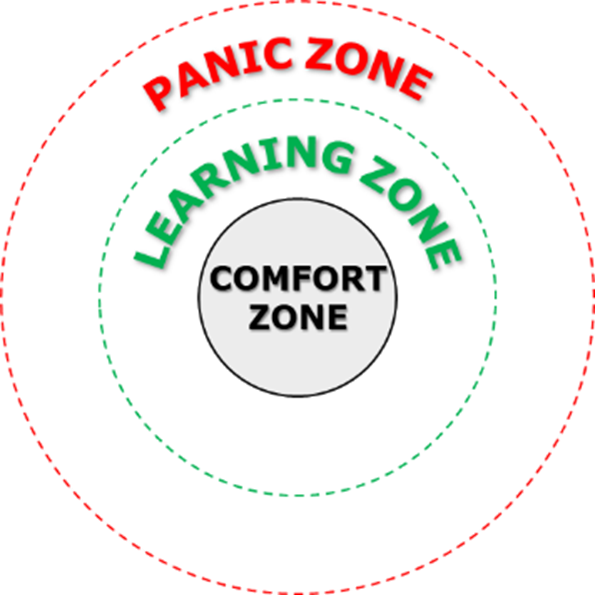How can we support ourselves and others to achieve sustainable growth and wellbeing in our workplace and in life itself?
Finding the right balance between life, work and wellbeing

Let’s start by talking about the ‘comfort zone’. The comfort zone translates to a mindset of: “I know what I know.” Unfortunately, there is nothing new coming out of the comfort zone. Indeed, it is our comfort zone because we’ve done things hundreds or thousands of times before. This zone is great to recharge our battery, but what happens if we stay in the comfort zone for too long? Well, we get bored and if we don’t do anything about it, we are running the risk of falling into depression!
The outer circle of the comfort zone is what we refer to as boundary conditions of our thinking. If we step outside the comfort zone, we move into the learning zone. This is where the ‘uncertainty’ and our growth live, as this is the relationship with: “I know there are things that I don’t know.”
The more curious and excited we are about this zone, the more we will learn and grow. But what happens if we step over the outer line of our learning zone? Well, that’s literally when we push ourselves and/or others over the edge, into the panic zone! This is where we experience way too much uncertainty because we expect too much in too little time from ourselves and others. It is neither healthy nor productive for anyone to be in the panic zone because this is where we get stressed and may even start to experience anxiety! If this occurs for too long and too often, we eventually experience burnout and depression. Let me explain…
When somebody is depressed, their body is saying: “Don’t do that to me anymore! I don’t want to (neither can I) be this overperforming person any longer. Because the pressure that I have been (or put myself) under for too long, is too high and unsustainable!”
We need to see the word ‘DEPRESSED’ as ‘DEEP REST’; for a body that is exhausted from putting much more energy out than it gets in return. Therefore, a ‘depressed’ person needs a ‘deep rest’ from the identity their body is tired to play and uphold; this is certainly not where we want to see anybody. However, there is a silver lining to depression. Often, after a breakdown comes a breakthrough where the body can consider new, more sustainable identities; recovering and re-charging the battery within the comfort zone and finding new inspiration to again step outside their comfort zone, but this time within reason (in other words, sustainably)!
Embracing the ACES
Sustainable growth, success and fulfilment in life, work and wellbeing comes down to finding balance between:
- Stepping outside our comfort zone to work and study hard
- Recharging our energy within our comfort zone.
What I’ve learned over the years is that most people completely overestimate what they can achieve in a day or a week, but also completely underestimate what they can achieve in a month or even a year.
I encourage you to be patient (so not to become a patient) and consistent in your approach! A great acronym to get desired results long-term and sustainably, is ACES, which stands for balance between:
Achievements
Set out to achieve something small every day, and work towards a clear goal, vision and purpose in your career, life and wellbeing. Ask yourself every single day: “What can I do today that gets me one step closer to my goals, vision and purpose?” This provides a great sense of achievement every single day and keeps you going.
Connection to others
Stay connected with other people, work colleagues, family, and friends. We are social creatures after all. This has never been more important than now. Connect with others in person, if possible, check in with each other, and connect.
Enjoyment
Pursuing a hobby, engaging in fun activities, and laughter are all good for our emotional and mental wellbeing. Create opportunities to do what you enjoy doing and do things that give you pleasure.
Self-care
Give yourself permission to spend time with yourself, chill and do things that are restful. Block out time to connect with yourself, have positive and supportive thoughts, and appreciate all that you have, your joys, successes, and progress. This attitude of gratitude strengthens your neural pathways that promote contentment and happiness.
Through these ACES activities, your body’s natural antidepressants, the neurotransmitters in your brain which help with balance, are being stimulated:
- Endorphins: The runner’s hormone that assists with pain relief, relaxation, and great achievements
- Oxytocin: The connection hormone that supports us with bonding, love, trust and belonging
- Dopamine: The motivational molecule in our brain’s reward system for pleasure and enjoyment
- Serotonin: The feel-good hormones in our gut, which are our mood stabiliser, the happy hormone for wellbeing and self-care
We have a choice; it is entirely up to us to let negativity and aversion allow to bring us down, or to confidently steer our ship through rough seas by looking at the horizon with courage, strength, hope and positivity.
I used to say, “If you take care of me, I take care of you.” Now, I say, “I take care of me for you, if you take care of you for me.” Therefore, I encourage you to implement ACES activities into your every day and treat yourself like a family member or close friend.
Thank you for choosing self-care over self-sacrifice and remember:
- You are worth it
- You are lovable; and
- You are enough!
We all are!
“Dare to make a difference!”











